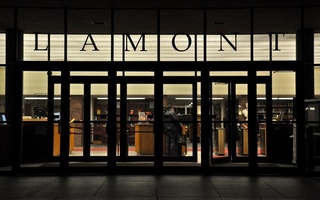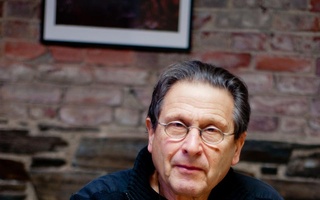Anne Carson is one of the most renowned Canadian poets alive today, having received, among other awards, the T.S. Eliot Prize for Poetry, a MacArthur Fellowship, and a Guggenheim Fellowship. Known for the genre-breaking original works “Short Talks,” “Autobiography of Red,” and “Red doc>,” much of her oeuvre is also the translation and reinterpretation of ancient Greek works. One such reinterpretation, “Antigonick,” is a book of dialogue printed in the poet’s original handwriting and illustrated by hand by Bianca Stone. The work is being performed this weekend by the Harvard-Radcliffe Dramatic Club at the Loeb Ex Theatre, under the direction of visiting director Ianthe Demos. Carson, who is travelling and could only be reached by email, discussed her work with The Crimson. Answers are printed as given.
The Harvard Crimson: Your work as a translator has focused mainly on the archaic and classical Greek canon (Sappho, the tragedians), rather than on the Hellenistic and later neoteric works. Why do you choose to translate the things you do?
Anne Carson: i like concision and drive in a writer
the Hellenistic authors give me a sense of amplitude and drift
THC: What's it like to be a woman working in the field of Classics?
AC: when i do Classics i belong to a third gender, the clear one
THC: “Antigonick,” as printed, is very clearly meant to be a physical object of beauty in addition to a work of literature. When you were working on it, did you intend it for performance, which divorces it from the physical object?
AC: i didn't think about staging it, but i did think about the sound of the language and making the lines sayable
there is a small theatre inside the mind that i aim at (i think) when i write lines of verse drama
beyond that i have no theatrical imagination
THC: Do you have any recommendations for the students who are putting on “Antigonick” here at Harvard?
AC: no screaming
THC: Do you frequently encounter the question, "Why are the classics important?” and what is your response?
AC: usually in the form "how can we the Classics relevant to people today" and my thought is, how can we make ourselves relevant to them
THC: Do you find that the loss of classical knowledge in the general public affects how you write?
AC: yes, i need to explain more. explanation however is a deep and democratic thing, i can a lot from explaining things that seemed obvious
THC: To return briefly to “Antigonick”: in your version of the play, you depart fairly radically from Sophocles' text; however, in your translation of Sappho, your approach is very literal, even reflecting the spacing of individual words on the papyri fragments in your translation. Why the difference in treatment?
AC: i am never sure what anyone means by "literal"
but in fact the treatment of Sappho (spacing etc) is not any kind of replica of the original but a conceptual gesture toward the fact of fragmentation and the changing power of time
a translation is a folding of the original, a fold within a fold or unfolding to the following fold
i don't think Antigonick "departs" from the original so much as unfolds it in a way it hadn't been before
Hegel and Beckett are part of the original in the way that the inside of a fold is just the inside of the outside of the fold
THC: In the case of Sappho, do you anticipate returning to “If Not, Winter,” should new fragments come to light?
AC: no i don't like going back
THC: What projects or interests are you involved with now? Any hints about things in the pipeline for which we should keep an eye out?
AC: i have given up writing for a while
and doing drawings instead
THC: Is there anything else you'd like to mention?
AC: i always like to mention Homer
Ianthe Demos is the artistic director of the One Year Lease Theater Company, an ensemble-based experimental theater in New York. She is directing the Harvard-Radcliffe Dramatic Club’s production of Anne Carson’s “Antigonick,” which debuted on Friday and will be being performed through this Sunday.
The Harvard Crimson: How is this production different from ones you’ve done before?
Ianthe Demos: It’s a take on an ancient Greek tragedy that’s not only untraditional…. She [Anne Carson] takes an ancient Greek tragedy and comments on it in a very modern, a very Anne Carson way—it deviates, it goes into poetics, it goes into Hegel, it goes into Beckett, and it goes into, I think, something very personal for her and her understanding of the story of “Antigone.” And as such, it’s as if you were in Anne Carson’s head when reading “Antigone”…. I think it’s one of those unproduceable plays.
THC: Do you try to translate the physical aspects of “Antigonick”—the illustrations, the hand-lettering—to the stage somehow, and if so, how?
ID: Yes, I have tried to translate what those images evoke for me to the stage somehow. Not translating the images as such, because I don’t believe in any theatrical work that what you’re doing is taking what’s on the page and trying to make it happen; you’re interpreting it, and so it is an interpretation of those images as well. That said, what do those images evoke for each of us? For me, they evoke this sense of vastness, this sense of the smallness of our existence in this vast universe, and yet perhaps the anger, the grief, the frustration, and also the humor that comes in that, when we can kind of understand a little bit about our place in this vastness, how it is laughable in one sense.
THC: Do you try to reach behind Anne Carson to Sophocles, or are you just interacting with the text as Carson presents it?
ID: I think you’re always trying to reach back, because she’s reaching back. I think one of the points of her text is this idea of how the ancient fuses into our modern understanding of the world, and that what’s inescapable about “Antigone” is the recurrence, not in a cyclical fashion, but… in that the same story plays out in different versions. So I think Carson taps back into it, and I think as a result, we can’t help but tap back into it. So one of the things I’ve played with—who knows if it’s successful or not—is at times to go toward what I think is very traditional staging and then blow it up.
THC: What made you want to do “Antigonick” in the first place?
ID: That it was impossible. That it was absolutely a challenge for me, that I think when we approach things for the stage we should always be challenging ourselves, and also that I was compelled by it.… It was that terrifying moment of “I have no idea of what I would do with this—so let’s give it a shot.”
Read more in Arts
Massey Lecture Profiles Bob Dylan's Murder Ballad


















